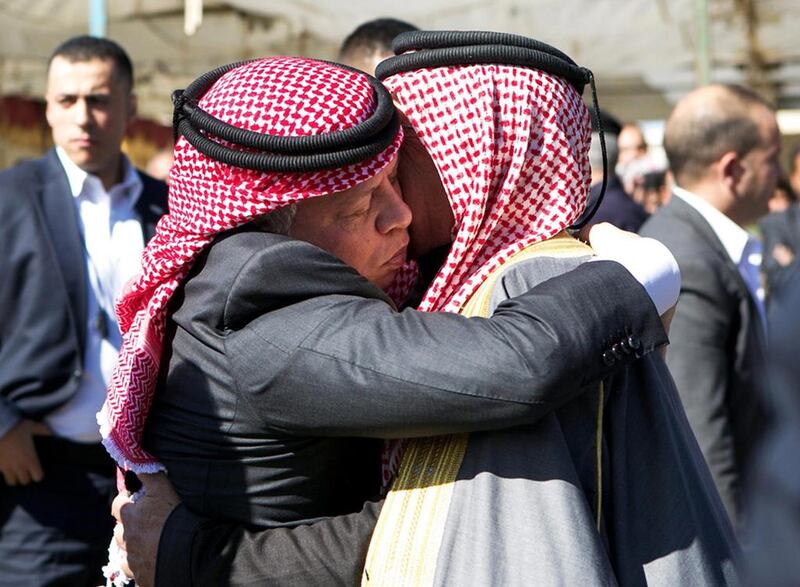AI, JORDAN // Maaz Al Kassasbeh, the Jordanian fighter pilot burned alive by ISIL militants, could have been anyone’s son in the tiny, remote village where he grew up.
About two hours drive from Amman, Ai sits on a hill in the central Karak governorate only a few kilometres from the Dead Sea and the Jordan Valley.
The impact of Al Kassasbeh’s death on Jordanians was unmistakeable on Thursday.
Hundreds of people, including King Abdullah, gathered inside a large white mourning tent in Ai to offer their condolences, as F-16 jets flew around the village in a military salute.
There were representatives from different tribes, government clerics, army officials, Palestinians, members the Christian community and extended family members.
Al Kassasbeh’s father, Safi, was surrounded at all times by men that grasped his hand and bowed their heads towards him.
Many young men in Jordan join the military, and in Ai almost every household has someone that is serving, according to residents.
“Maaz is a martyr for every Jordanian house,” said Faisal Al Kassasbeh, a member of the extended clan who had served more than 20 years in the army and was now living back in the village.
One of Al Kassasbeh’s uncles, Mohammed, said that as a boy his nephew had always played with toy planes and expressed a desire to fly.
Another uncle, Fahed, said he and Al Kassasbeh were like friends. When the pilot was considering joining the military he consulted with Fahed.
Was it a good idea to join? “It was his passion,” Fahed said. “I said, ‘it’s good.’ It’s an honour to be a pilot.”
Fahed said he had himself served in the armed forces for 31 years, retiring as a general. While several men from the area had died in the 1973 war with Israel, he said the country had never experienced an incident as horrific as his nephew’s killing.
The closest they came was the terror attacks in 2005, when 60 people were killed by Al Qaeda in Iraq, a predecessor to ISIL, at three hotels in Amman on a single night.
"We are expecting a forceful response from Jordan's military and they are doing it now," Fahed said, in reference to the attacks Jordan carried out on ISIL militants in Syria since the video of Al Kassasbeh's death was released on Tuesday night.
Mohammed has a 25-year-old son currently in Jordan’s national guard.
While Al Kassasbeh’s death might have made some servicemen more concerned about being in the armed forces, it was the contrary for him. The killing of his cousin “motivates” him even more, he said of his son.
In another sign of solidarity with Jordan’s government, Mohammed claimed that his brother Safi had promised King Abdullah 12 new recruits for the armed forces – his other sons and the nine of his brothers’.
Miqdad Al Kassasbeh, 23, another member of the extended clan, lived three doors down from Al Kassasbeh’s family home in Ai.
He used to hang out with the pilot on the streets, talking with other young men. After Al Kassasbeh joined the air force, he only joined them on his weekends home.
He often described his job as a pilot zealously – the inner workings of the F-16 fighter jet that he flew, how much fuel it used, the functions of radar, and how to attack a specific set of coordinates.
Miqdad said Al Kassasbeh was “shy” and didn’t speak often unless he was asked a question, but he was clearly proud to be a fighter pilot.
“He was happy in his job. He was also proud of himself, but not conceited. It’s rare to find someone from this village who is a pilot. He made his family proud of him.”
Miqdad heard of Al Kassasbeh’s capture by ISIL just two days after he had completed university studies. His happiness turned to horror.
“I saw in the news that one Jordanian air force pilot was hit. They only gave the initials, but he has rare initials. Anyone could figure it out.”
Al Kassasbeh’s family and friends spent the time between when he was captured and the video of his death being released “hoping and praying”, Miqdad said.
Now that he is dead they “ask for revenge for Maaz. For his life and the safety of the country. We don’t want to lose another Maaz,” Miqdad said.
jvela@thenational.ae





